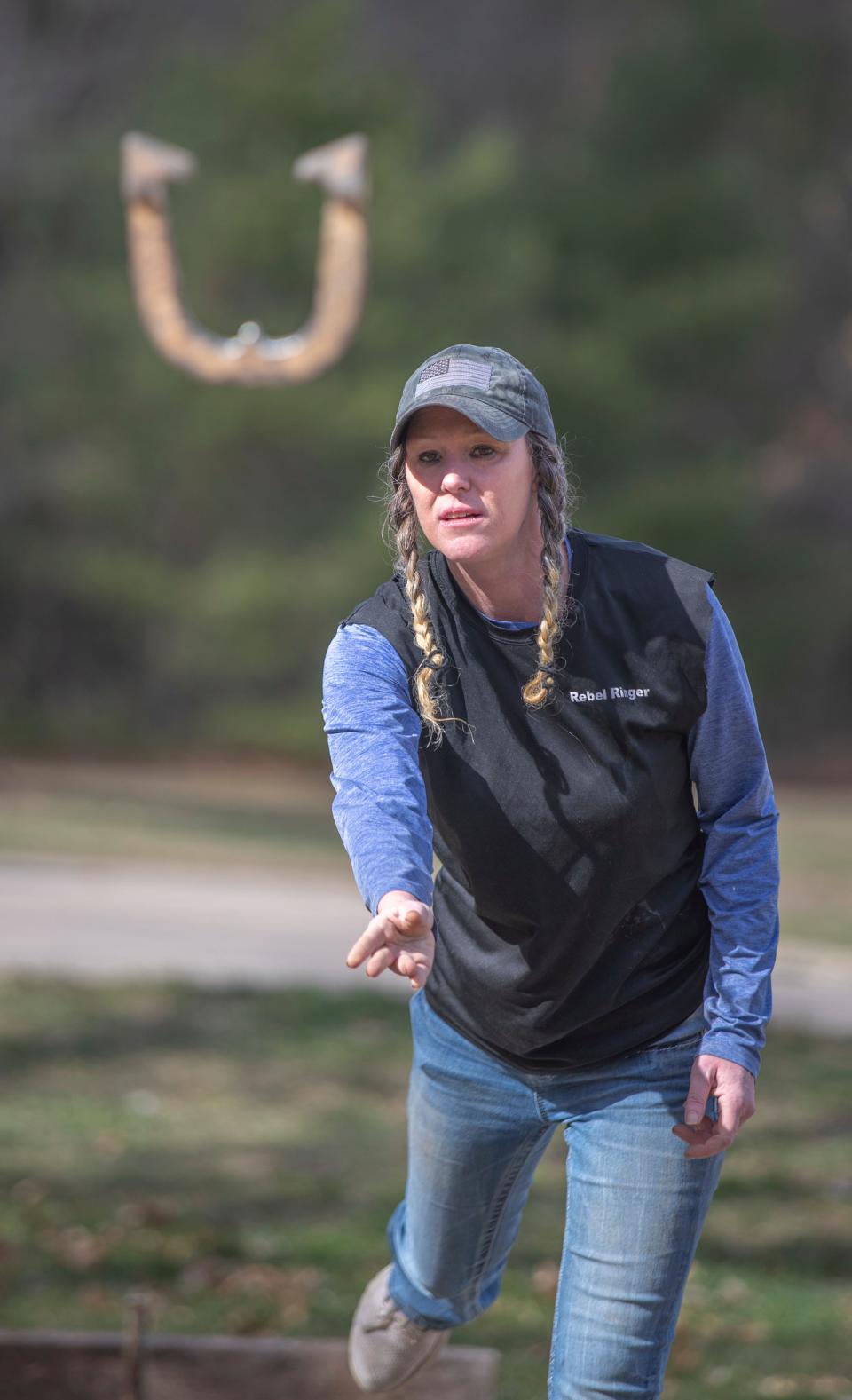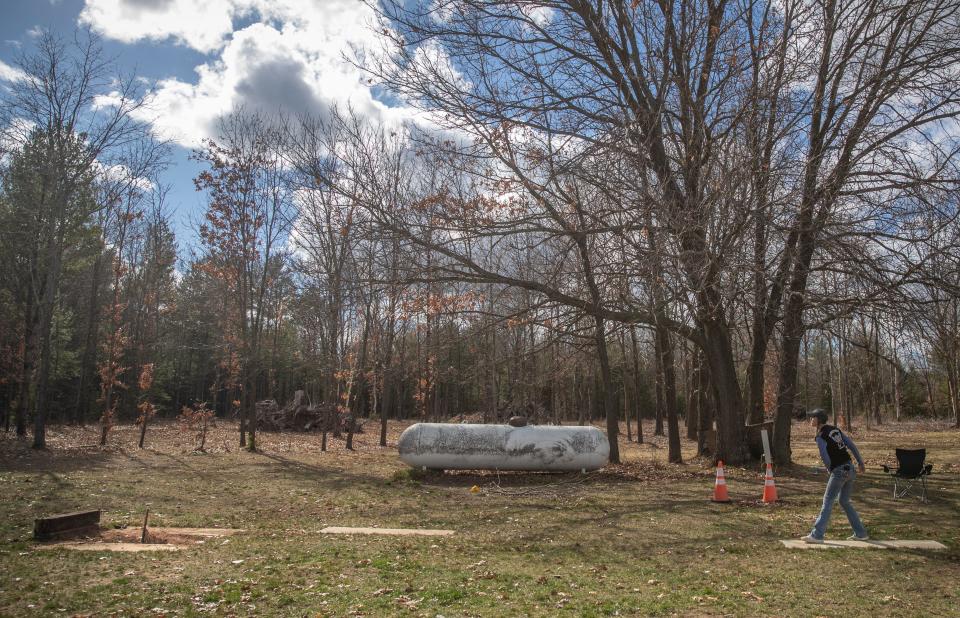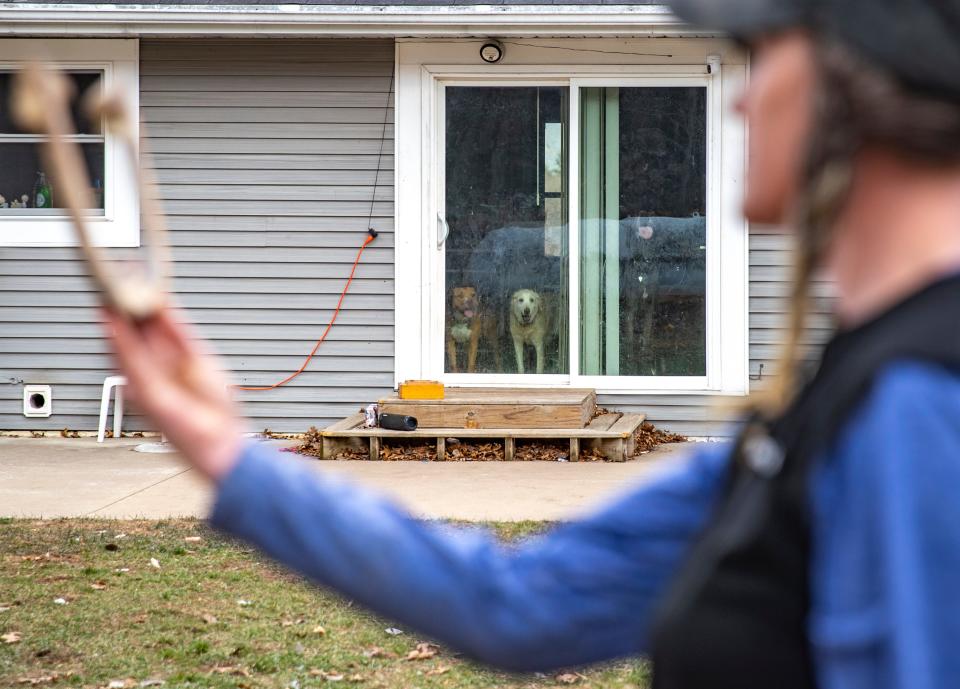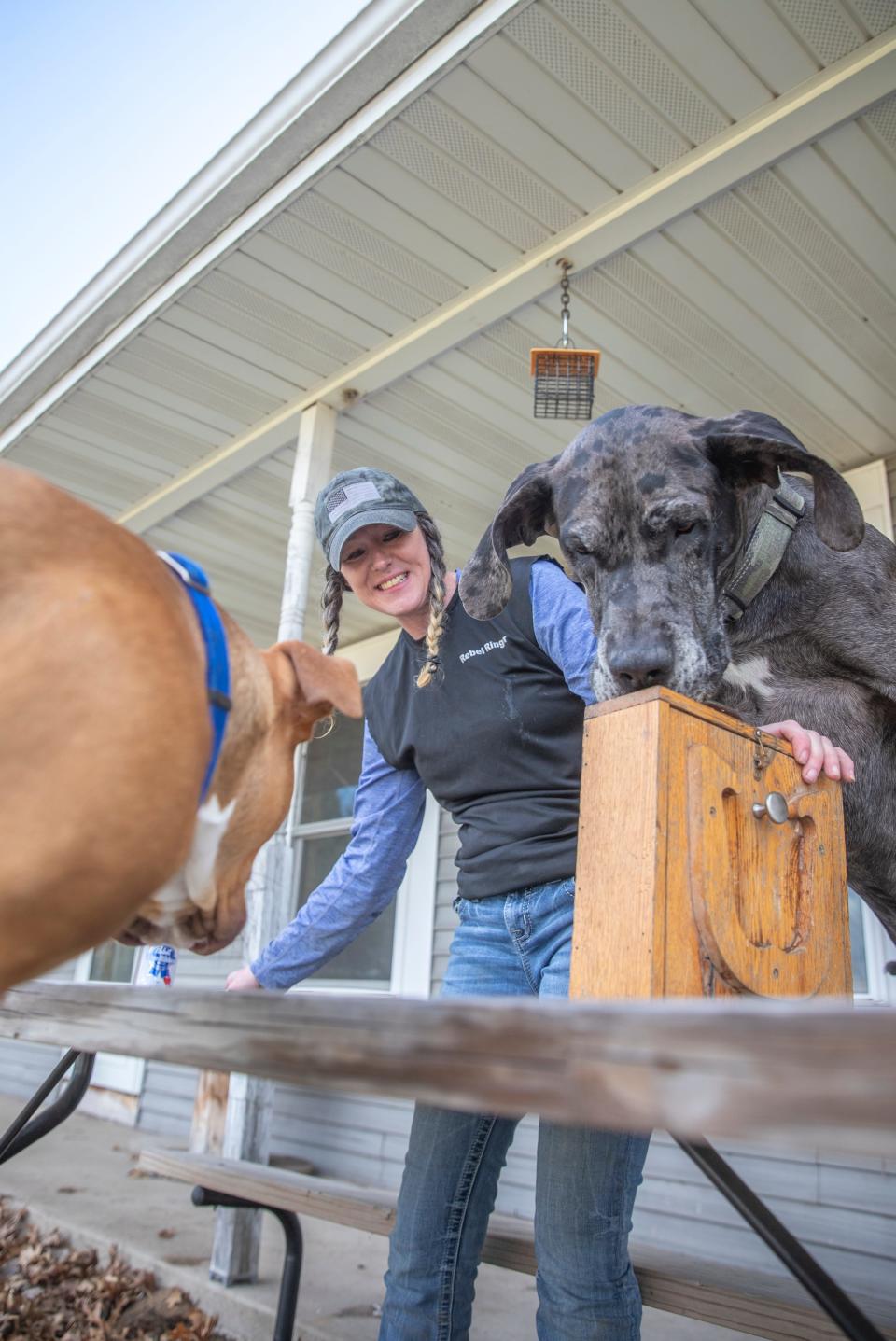'Some days, it's my whole world': Horseshoes helps this blind athlete deal with rare disease
Like so many athletes, horseshoe pitcher Paula Schwerdtfeger goes through a routine before she throws in competition.
Looking down at her feet, Schwerdtfeger walks slowly to her spot, a little more than a step away from the women's foul line on the long narrow court. Once there, Schwerdtfeger takes a deep breath or two. She deftly flips the horseshoe in her right hand a few times. More deep breaths.
Sometimes, for a second or two, she extends her arms straight out to her sides until they are horizontal and parallel to the ground, like a scarecrow. Deep breath. She lifts the right horseshoe in front of her face, centering it with the court. Then slowly, gently, Schwerdtfeger moves her right arm back, pauses a beat and then swings it forward like a pendulum. At the same time, she steps forward and lets go of the horseshoe, using her entire body's momentum to give the shoe toss loft and distance. Done right, the shoe will flip once in the air and land around the stake with a clang.
Schwerdtfeger isn't unusual. People who, like her, pitch horseshoes in tournaments such as those sanctioned by the Wisconsin Horseshoe Pitching Association, get passionate about the sport. But no one loves throwing more than Schwerdtfeger, a 47-year-old from Waupaca. Especially now.
Schwerdtfeger has a genetic disease called hereditary sensory and autonomic neuropathy, which manifests itself in a variety of ways. Schwerdtfeger doesn't have a lot of feeling in her feet and hands, so she can burn them without knowing it. She can have trouble with her balance. Her muscles are slowly weakening. But the most serious symptom is blindness. Starting about 2020, the neuropathy likely triggered a disease affecting her eyes, macular telangiectasia type 2, commonly shortened to "type 2 mactell." It wasn't long before she was declared legally blind, and she left formal horseshoe competition for about three years.

She defied the odds and came back late last year, with the help and support of a fellow horseshoe pitcher and some adaptations to compensate for her loss of vision. She threw in a small tournament for the first time this year on April 13, and took second place.
Schwerdtfeger doesn't know how long she'll be able to throw, but she aims to compete in national and world-level competitions before her health prevents her from competing. As the disease increasingly limits her life — she can't drive or work and spends most of her time at home — her horseshoe world has grown in significance.
"Horseshoes is my superpower, which is really weird. I mean, I would have rather gotten business sense," Schwerdtfeger said. "Some days, it's my whole world."

Blindness takes a back seat when she's throwing horseshoes
The sanctioned tournament that Schwerdtfeger threw in on April 13 was held at Summit Ridge, a purpose-built private horseshoe pitching facility in rural Wonewoc, about nine miles south of Mauston. It was a small affair, with six competitors. They all played each other once for a total of five games, throwing 40 times each game.
A spectator who didn't know Schwerdtfeger was blind would have been hard pressed to tell just by watching her. One clue was that she wore a headset with a mic on it, attached to a small walkie-talkie she clipped to the back pocket of her jeans. The set up allowed her to talk with her friend, mentor and fellow horseshoe pitcher, Kent Frailing, who sat in a narrow spectators balcony above the courts.
Frailing, a veteran horseshoe pitcher from Mosinee, helped push Schwerdtfeger into her comeback. He deeply relates to her experience because his eyesight, too, was once failing.
Frailing had cataracts around 2019, not so very long before Schwerdtfeger's type 2 mactell set in. He struggled with pitching, he said, and considered leaving the sport. Schwerdtfeger "kept me from quitting horseshoes," Frailing said. "The difference was, I had surgery. She can't."
So when situation was reversed, Frailing was there for Schwerdtfeger, and came up with a plan that allowed her to get back to competing. He would be her eyes.
It started last year when Frailing stood with Schwerdtfeger on the court, and told her where her shoes were landing. He could describe what was happening on the opposite end of the court that Schwerdtfeger couldn't see. That worked, but proved distracting to other players.
That's when Frailing came up with idea to use the radios, and got the adaption approved for competition through the Wisconsin Horseshoe Pitching Association, with hopes to get permission at national and world levels.

Her friend and fellow horseshoe pitcher is her 'eyes' when she competes
It was surprisingly quiet during the games on April 13. There was a radio playing classic rock music, but the volume was low. The loudest noises are the ringers or the horseshoes banging into each other.
Frailing spoke quietly into his mic, describing to Schwerdtfeger where her and her opponents' shoes landed. On the shots she missed, he would softly tell her her shoe was right or left of the stake, that her throw was too hard or too soft.
At one point during a game, after one opponent threw a shoe that ended up propped against the front of the stake, Frailing told her, "You got a leaner there. Throw soft, and a little bit higher."
Schwerdtfeger understood. After her routine, she lofted a ringer that landed in the perfect spot, just above the leaner, clanging home on the stake.
"Thatta girl, Paula," Frailing said.
Schwerdtfeger pumped her fist on the court below.

Next time, there will be spare batteries
The April 13 tourney was a test of the radio communication. It worked well.
Schwerdtfeger struggled in her first game, shooting ringers only 17.5% of the time. That was understandable. It had been months since she competed, and she was getting the feel for horseshoes and the courts. She came roaring back in the second game, shooting 40% ringers (30% is considered good, according to the WHPA).
Schwerdtfeger, despite having momentary frustrations, and feeling a bit tired as the games progressed, kept improving, getting 45% ringers in her third game and a terrific 50% in her fourth.
But then the batteries on the radio system died. "She's completely on her own," Frailing said.
Without having the his voice in her ear describing the plays, and feeling a bit stressed, Schwerdtfeger's ringer percentage dropped to 37.5%. Still good, but she also was disappointed and frustrated during the game. Her overall percentage ended up being 38% of ringers for the day.
"This tournament was meant to be a test of this system," Frialing said. "Now we know we gotta bring extra batteries."
The state tournament will be held in Wausau this year, and there's no reason to think she won't be there.
"I'm proud of myself," she said, after it was all over.
Keith Uhlig is a regional features reporter for USA TODAY NETWORK-Wisconsin based in Wausau. Contact him at 715-845-0651 or kuhlig@gannett.com. Follow him at @UhligK on X, formerly Twitter, and Instagram or on Facebook.
This article originally appeared on Green Bay Press-Gazette: Horseshoes helps blind woman deal with rare genetic neuropathy, type 2 mactell

